#The Homestead Act
Text
It's been a year btw you can stop acting like the show written by a zionist and an anticommunist based on a zombie shooter game was "prestige TV"
153 notes
·
View notes
Text

Okay, I’ve now seen the unaltered version of this cartoon being shared uncritically by too many fucking leftist pages.
The original first image read “You can have these 200 acres for free if you grow some turnips on it or whatever”. I’ve had to alter it (badly) to made it clearer what it actually refers to.
It refers to the US Homesteading Acts, where white settlers were offered legal deeds to 200 acres of land if they kept it under an agreed and attested level of cultivation for 5-10 years (different acts had different provisions).
The *specific* reason this was offered was literally as part of the US’ policy of indigenous American genocide. They were designed *specifically* to get land belonging to and utilised by indigenous Americans into the white, European-designed legal system the US utilised (and still utilises) with a trail of ownership to *white* people so that that could be weaponised to force indigenous American tribes off their land.
It’s not “people had it better in the past”; it’s specifically “a certain group of people were actively privileged over another group and recruited to benefit from the genocide of the second group so they would take part in that genocide”.
Genocides, by and large, don’t simply happen because of baseless ideological hatred. They’re driven by material and economic interests, and the ideology is put in place to cover and legitimise this - whether to the people taking part in it or to the wider world.
In most of the world today, and *certainly* in settler colonial and former colonial powers like the US, Canada, and the UK, any calls for social and economic justice that erase genocide and colonialism, and the material benefit our states today have attained due to them, are *still* taking part in genocide and colonialism, and so are we, as individuals, if we allow this discourse to go by unchallenged.
#housing#land back#genocide#homesteading acts were genocide#settler colonialism#erasing genocide is perpetuating genocide#erasing colonialism is perpetuating colonialism#us history#history#modern history#badly corrected meme#indigenous rights
74 notes
·
View notes
Text
I....... I finished bg3.......
#my og playthrough has been fully played through#i#uh#im#idk what#i dont#what do i do now#i mean i got my durge playthrough (hust reached act 3)#and karlach (somewhere in act 1)#but it's..... over#romanced astarion and chose to look for a way to have him walk in the sun again#though i imagine we also stop in at the underdark vampire homestead#(which just... works so well for my tav's backstory [drow with complicated history w/ underdark])#but that's besides the point#you know. of all the companions in the epilogue seeing shadowheart so happy and free adventuring got me the most emotional#she just seemed to much.... lighter (no pun intended)#alao since her first stop in travelling was waterdeep i headcanon that she helped gale fish the crown from the sea#and they both made the journey to waterdeep together#(hence them having tea at his ans tara's tower)#bg3
14 notes
·
View notes
Text
American apartheid-Hawaii
#hawaii#lahaina#Hawaii homestead act#vital community#vital information exchange#vitalportal#thevitalportal#additional information#vital media#blacklivesmatter#blacktwitter#vital politics#myvitaltv
4 notes
·
View notes
Text
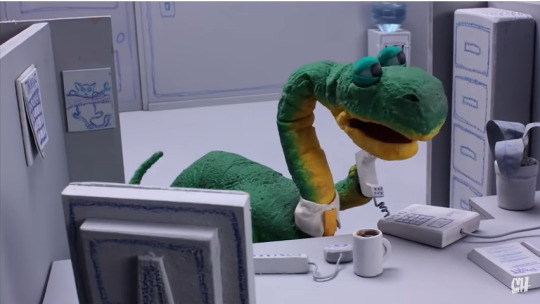

Currently thinking about: Animated web series about a small cast of non-human characters and the relationships between them, mostly taking place in a featureless white environment and a lot of surreal humor derived from the characters underreacting to the absurdism around them.
#dinosaur office#baman piderman#nintendo 3ds#surreal#i guess technically dinosaur office isn't a web series but whatever#web series#If anyone has any other examples of these please let me know#they don't even have to be featureless white environments I just want more of characters underreacting to things#same vibe different energy#dinosaur office is all corporate and everyone is yelling all the time and occasionally act up and destroy something#baman piderman is a homestead environment and very calm and low-energy
26 notes
·
View notes
Text
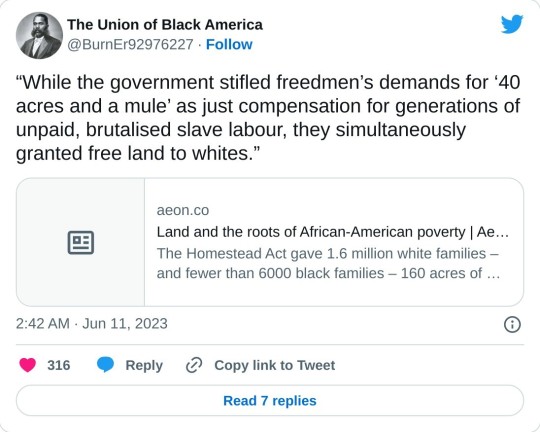
Land and the roots of African-American poverty
Keri Leigh Merritt
is a historian and independent scholar. Her research focuses on race and class in US history. Her first book, Masterless Men: Poor Whites, Slavery, and Capitalism in the Deep South, will be published by Cambridge University Press next year.
Edited by Sam Haselby
900 words

African-American family at the Hermitage, Savannah, Georgia in 1907. Photo courtesy of the Library of Congress
Shortly after emancipation in 1865, African Americans began fighting for the rights to the lands they had long worked – cultivated by their hands, fed by their sweat, and stained by their blood. Yet while the government stifled freedmen’s demands for ‘40 acres and a mule’ as just compensation for generations of unpaid, brutalised slave labour, they simultaneously granted free land to whites.
Indeed, when the failure of land distribution among blacks during the Reconstruction is judged within the context of the Homestead Acts, the reality of the situation is laid bare. The problem was never the radical nature of land reform. The problem was racism.
When judged comparatively with other nations’ emancipatory histories, the Reconstruction experience in the United States is unique. While African Americans were the only freed slaves to be granted political rights so soon after emancipation, those rights were limited for a people without capital or job prospects. Land would have served as the primary source for reparations.
President Abraham Lincoln signed the original Homestead Act into law during the second year of the Civil War. Between 1868 and 1934, it granted 246 million acres of western land – an area close to the land mass of both California and Texas – to individual Americans, virtually for free. To receive 160 acres of government land, claimants had to complete a three-part process: first, file an application. Second, improve the land for five years. Third, file for the deed of ownership.
Because of the date of the Act’s passage, few people from the South initially received any benefit from it. Yet given that it effectively remained in place until 1934, well over 1.5 million white families – both American-born and immigrant – eventually profited from it. And, although the process was rife with fraud, as many homesteaders sold their plots to corporations, the original claimants pocketed the income from land sales, establishing a basis of wealth and capital. By the end of the Act, more than 270 million acres of western land had been transferred to individuals, almost all of whom were white. Nearly 10 per cent of all the land in the entire US was given to homesteaders for little more than a filing fee.
Enacted in 1866 shortly after the end of the Civil War, the Southern Homestead Act (SHA) was supposed to function much like the original Act. During the first year of the SHA, unoccupied southern land was offered exclusively to African Americans and loyal whites, but after 1867 even landless former Confederates applied.
Although the SHA ostensibly offered a solution to several pressing Reconstruction-era issues, in reality, a large percentage of the land offered was un-farmable, being either heavily wooded or covered with swamps. Furthermore, it was hard to administratively arrange homesteading, as many southern states had only one land office. Depending on where the office was located, it could take several weeks to simply make the trip, meaning the bureaucratic duties cost far more than the filing fees for the actual land.
Furthermore, the recently emancipated owned no cash and had no experience in dealing with the government, rendering the process even more difficult. But perhaps the biggest hurdle for freedpeople involved the year-long labour contracts they had been cajoled or forced into signing shortly after slavery was outlawed. Leaving a job before the end date of a contract frequently resulted in virtual re-enslavement on a chain gang. Indeed, blacks had been locked into these contracts until the very date (1 January 1867) that they stopped receiving special homesteading benefits.
By the end of the SHA 10 years later, nearly 28,000 individuals had been awarded land. Combined with the claimants of the original Homestead Act, then, more than 1.6 million white families – both native-born and immigrant – succeeded in becoming landowners during the next several decades. Conversely, only 4,000 to 5,500 African-American claimants ever received final land patents from the SHA.
The Homestead Acts were unquestionably the most extensive, radical, redistributive governmental policy in US history. The number of adult descendants of the original Homestead Act recipients living in the year 2000 was estimated to be around 46 million people, about a quarter of the US adult population. If that many white Americans can trace their legacy of wealth and property ownership to a single entitlement programme, then the perpetuation of black poverty must also be linked to national policy. Indeed, the Homestead Acts excluded African Americans not in letter, but in practice – a template that the government would propagate for the next century and a half.
With the advent of emancipation, therefore, blacks became the only race in the US ever to start out, as an entire people, with close to zero capital. Having nothing else upon which to build or generate wealth, the majority of freedmen had little real chance of breaking the cycles of poverty created by slavery, and perpetuated by federal policy. The stain of slavery, it seems, is much more widespread and lasting than many Americans have admitted. Yet it is the legacy of the Reconstruction – particularly the failure of land redistribution – that so closely coupled poverty and race in the US.
#Land and the roots of African-American poverty#systemic racism#american hate#disinfranchisement#racism#white supremacy#land#homesteads act#emancipation#reconstruction#southern homesteads act#civil war
11 notes
·
View notes
Text
i think hiveswap act 1, esp in joey’s room, is rlly good at emulating the feeling of media like the raggedy ann film or the cats mewsical, while mostly resembling older point n click games. its nostalgic, of course, but its also just so comforting in a unique way. the soundtrack and art really contributes to that, i think
3 notes
·
View notes
Text
A Homosexual Homestead
Introduction
Hello!
Today I have a story to share with you, which is told through Journals. I really enjoy the story here; however, I do need to preface these with some information.
This story involves a lot of discussions and actions related to the Westward Expansion of white people in the United States. Specifically the Homestead Acts of 1862.
This expansion was done with little to no respect for or acknowledgment of Indigenous Peoples and their cultures or their use of the land. While the people whose stories are chronicled in this journal never encounter indigenous people (or they never wrote it down if they did), they are still using a racist tool of a colonizing government to lay claim to land which their government had no ownership of.
At the end of the story, I’ve linked information and resources if you’d like to learn more about indigenous people, westward expansion, or The Homestead Acts.
I think there is still value in sharing this story, but I wanted to make sure it existed with the proper historical context.
The story below is precious and heartwarming. I hope you enjoy it.
Happy reading
Content Warnings:
Familial expectation to marry
Mentions of family death
Colonization of Indigenous land
Also posted assumptive-anthology.com
Journal
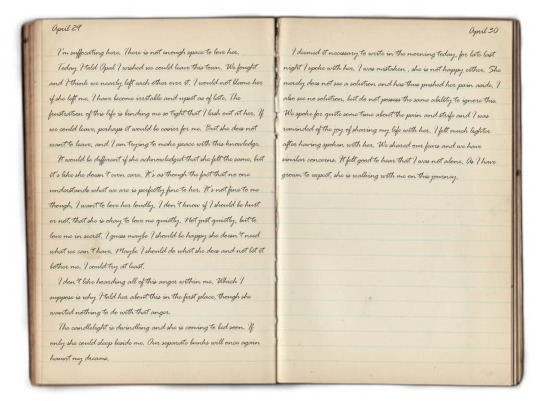
April 29th
I’m suffocating here. There is not enough space to love her.
Today I told Opal I wished we could leave this town. We fought, and I think we nearly left each other over it. I would not blame her if she left me. I have become irritable and upset as of late. The frustration of this life is binding me so tight that I lash out at her. If we could leave, perhaps it would be easier for me. But she does not want to leave, and I am trying to make peace with this knowledge.
It would be different if she acknowledged that she felt the same, but it's like she doesn't even care. It’s as though the fact that no one understands what we are is perfectly fine to her. It’s not fine to me, though. I want to love her loudly. I don’t know if I should be hurt or not, that she is okay to love me quietly. Not just quietly, but to love me in secret. I guess maybe I should be happy she doesn't need what we can't have. Maybe I should do what she does and not let it bother me. I could try, at least.
I don't like hoarding all of this anger within me. Which I suppose is why I told her about this in the first place, though she wanted nothing to do with that anger.
The candlelight is dwindling, and she is coming to bed soon. If only she could sleep beside me. Our separate bunks will once again haunt my dreams.
April 30th
I deemed it necessary to write in the morning today, for late last night, I spoke with her. I was mistaken. She is not happy either. She merely does not see a solution and has thus pushed her pain aside. I also see no solution, but do not possess the same ability to ignore this. We spoke for quite some time about the pain and strife, and I was reminded of the joy of sharing my life with her. I felt much lighter after having spoken with her. We shared our fears, and we have similar concerns. It felt good to hear that I was not alone. As I have grown to expect, she is walking with me on this journey.
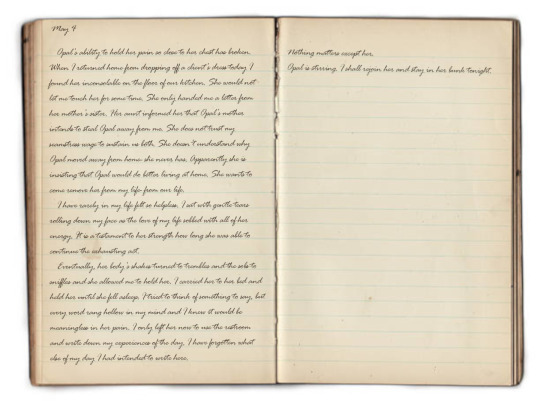
May 4th
Opal’s ability to hold her pain so close to her chest has broken. When I returned home from dropping off a client’s dress today, I found her inconsolable on the floor of our kitchen. She would not let me touch her for some time. She only handed me a letter from her mother’s sister. Her aunt informed her that Opal’s mother intends to steal Opal away from me. She does not trust my seamstress wage to sustain us both. She doesn’t understand why Opal moved away from home- she never has. Apparently, she is insisting that Opal would do better living at home. She wants to come remove her from my life- from our life.
I have rarely in my life felt so helpless. I sat with gentle tears rolling down my face as the love of my life sobbed with all of her energy. It is a testament to her strength how long she was able to continue the exhausting act.
Eventually, her body’s shakes turned to trembles and the sobs to sniffles, and she allowed me to hold her. I carried her to her bed and held her until she fell asleep. I tried to think of something to say, but every word rang hollow in my mind, and I knew it would be meaningless in her pain. I only left her now to use the restroom and write down my experiences of the day. I have forgotten what else of my day I had intended to write here.
Nothing matters except her.
Opal is stirring. I shall rejoin her and stay in her bunk tonight.

May 5th
Today was better. I had several dresses for local girls, which I was to finish sewing, and Opal is to hear back soon on her application to the new shoe factory. We are hopeful that if she gets a job, her mother will relent in her insistence that Opal is better off at home.
It is said this factory will accept female workers there if they are skilled, and I know my love is skilled. Her father taught her much when she was young, and now I suspect she knows more about shoe making than many of the men who are hired. (Sometimes, I have heard her wish aloud that she was a man, that this might help her receive better jobs and higher wages. I remind her that her feminine charm is what attracted me to her, and she often grows quiet. There is a smile on her face in those moments that I yearn to understand.)
With Opal’s permission, I burnt the letter from her aunt in the fire. She was not in the room, but I couldn’t pull my eyes away. The anger at those who have caused her such pain roared within me as the fire turned their words to embers.
May 7th
Opal did not get the job.
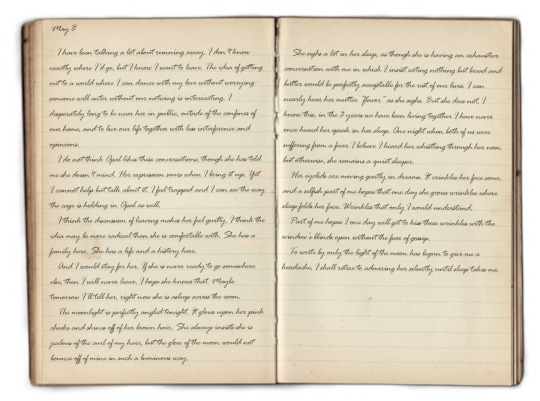
May 8th
I have been talking a lot about running away. I don’t know exactly where I’d go, but I know I want to leave. The idea of getting out to a world where I can dance with my love without worrying someone will enter without our noticing is intoxicating. I desperately long to be near her in public, outside of the confines of our home, and to live our life together with less interference and opinions.
I do not think Opal likes these conversations, though she has told me she doesn’t mind. Her expression sours when I bring it up. Yet I cannot help but talk about it. I feel trapped, and I can see the way the cage is holding Opal as well.
I think the discussion of leaving makes her feel guilty. I think the idea may be more radical than she is comfortable with. She has a family here. She has a life and a history here.
And I would stay for her. If she is never ready to go somewhere else, then I will never leave. I hope she knows that. Maybe tomorrow I’ll tell her. Right now, she is asleep across the room.
The moonlight is perfectly angled tonight. It glows upon her pink cheeks and shines off of her brown hair. She always insists she is jealous of the curl of my hair, but the glow of the moon would not bounce off of mine in such a luminous way.
She sighs a lot in her sleep, as though she is having an exhaustive conversation with me in which I insist eating nothing but bread and butter would be perfectly acceptable for the rest of our lives. I can nearly hear her mutter “flavor” as she sighs. But she does not. I know this. In the 3 years we have been living together, I have never once heard her speak in her sleep. One night when both of us were suffering from a fever, I believe I heard her whistling through her nose, but otherwise, she remains a quiet sleeper.
Her eyelids are moving gently in dreams. It crinkles her face some, and a selfish part of me hopes that one day she grows wrinkles where sleep folds her face. Wrinkles that only I would understand.
Part of me hopes I one day will get to kiss those wrinkles with the window’s blinds open without the fear of gossip.
To write by only the light of the moon has begun to give me a headache. I shall retire to admiring her silently until sleep takes me.

May 12th
Opal’s mother, April, came over today. She has never been a shouter (According to Opal), but the disappointment was clear on her face. She did not take her shoes off as she entered. Upon arriving (without giving us more than a half day’s notice), she began to judge the size of our small home. She asked about money and how much work I got. At one point, she implied that no husband would ever let Opal live in such a terrible place.
The worst was over dinner. Our friends Austin and James (two gentlemen much like ourselves in their struggles) came over since we did not have time to cancel our plans. She spent much of the night trying to enquire about why none of us were dating. Had we ever dated? Well, why not? Surely it was worth trying? What types of dates would one even go on around here? Oh, to the pond? Well, HER Opal loves the pond.
It was exhausting. And we did not yet get a chance to apologize because April insisted on walking them out with us. The only thing which would have made the evening more embarrassing is if April had thought it appropriate to comment on the brown color of either man’s skin. Thankfully she held her tongue in this regard.
We went to bed early, and I didn’t dare even hug Opal before we went to bed. To risk such behavior would have caused Opal nothing but worry. Her mother is staying the night. We hope she will leave in the morning.
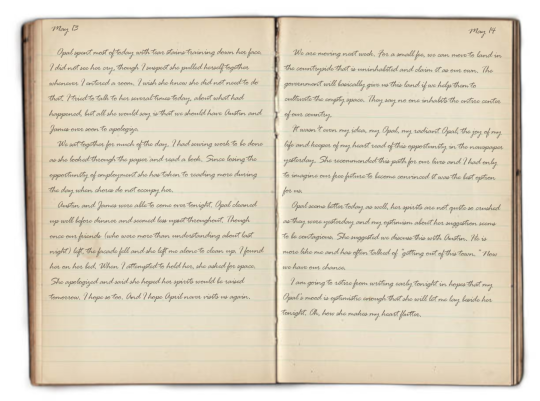
May 13th
Opal spent most of today with tear stains trailing down her face. I did not see her cry, though I suspect she pulled herself together whenever I entered a room. I wish she knew she did not need to do that. I tried to talk to her several times today about what had happened, but all she would say is that we should have Austin and James over soon to apologize.
We sat together for much of the day. I had sewing work to be done as she looked through the paper and read a book. Since losing the opportunity of employment, she has taken to reading more during the day when chores do not occupy her.
Austin and James were able to come over tonight. Opal cleaned up well before dinner and seemed less upset throughout. Though once our friends (who were more than understanding about last night) left, the facade fell, and she left me alone to clean up. I found her on her bed. When I attempted to hold her, she asked for space. She apologized and said she hoped her spirits would be raised tomorrow. I hope so too. And I hope April never visits us again.
May 14th
We are moving next week. For a small fee, we can move to land in the countryside that is uninhabited and claim it as our own. The government will basically give us this land if we help them to cultivate the empty space. They say no one inhabits the entire center of our country.
It wasn’t even my idea, my Opal, my radiant Opal, the joy of my life and keeper of my heart, read of this opportunity in the newspaper yesterday. She recommended this path for our lives, and I had only to imagine our free future to become convinced it was the best option for us.
Opal seems better today as well, her spirits are not quite as crushed as they were yesterday, and my optimism about her suggestion seems to be contagious. She suggested we discuss this with Austin. He is more like me and has often talked of “getting out of this town.” Now we have our chance.
I am going to retire from writing early tonight in hopes that my Opal’s mood is optimistic enough that she will let me lay beside her tonight. Oh, how she makes my heart flutter.
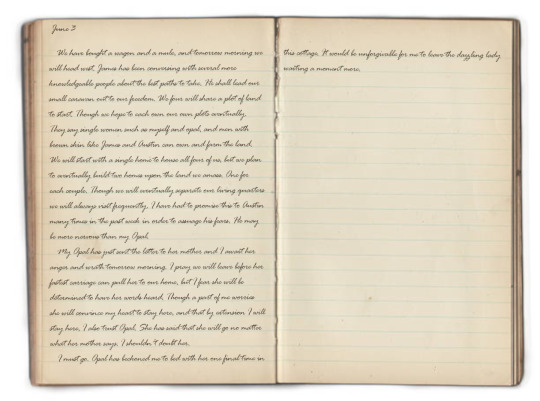
June 3rd
We have bought a wagon and a mule, and tomorrow morning we will head west. James has been conversing with several more knowledgeable people about the best paths to take. He shall lead our small caravan out to our freedom. We four will share a plot of land to start. Though we hope to each own our own plots eventually. They say single women, such as myself and Opal, and men with brown skin, like James and Austin, can own and farm the land. We will start with a single home to house all four of us, but we plan to eventually build two homes on the land we amass. One for each couple. Though we will eventually separate our living quarters, we will always visit frequently. I have had to promise this to Austin many times in the past week in order to assuage his fears. He may be more nervous than my Opal.
My Opal has just sent the letter to her mother, and I await her anger and wrath tomorrow morning. I pray we will leave before her fastest carriage can pull her to our home, but I fear she will be determined to have her words heard. Though a part of me worries she will convince my heart to stay here and that, by extension, I will stay here, I also trust Opal. She has said that she will go no matter what her mother says. I shouldn’t doubt her.
I must go. Opal has beckoned me to bed with her one final time in this cottage. It would be unforgivable for me to leave the dazzling lady waiting a moment more.

June 4th
It was her singing which made the travel bearable. When making our plans, we did not prepare for the possibility that my stomach would turn in knots as our mules pulled us forward. The only thing that brought some peace (in the form of distraction) was her singing. She has such a beautiful voice. Like a gentle wind chime playing just for me.
James and Austin stopped less frequently than we were forced to, but our friends were kind enough to stop before the sun set. We caught up to them just as the darkness overtook the gentle colors of the sky. I am grateful for the solid ground tonight. In our plans, we had discussed driving in shifts and sleeping on our wagons. I do not think I would have slept. The ground does not move and sway beneath me. My stomach has finally settled as my head rests on the ground beside my love.
She sang me a song I had never heard her sing before. It was mournful and gentle in its tale. It wove beautiful melodies together with the tale of an absent father. I wonder if her mother taught her the song. I wonder again why she has never mentioned a grandfather.
In her song and the lyrics she chose to share with me on our first day’s journey, I felt her pain. To leave behind my family was simple. We are not close, and my parents are not kind. My only regret is that I am leaving behind the graves of my 3 siblings, who never got to grow up. I do not mourn for the living. I think Opal does. I think she misses her mother, despite the misfortune of their last few encounters.
April was a kind woman. She was not one to give in to bouts of rage and, until the past year, had loved each of her children equally and loudly. The clearest image of her in my mind is of her face as her eldest son was wed. She wore a face of such ecstasy as tears of joy were patted away with a handkerchief. It was the kind of joy that leaked out of a person and into everyone lucky enough to stand around them. I only wish she could have seen a future for Opal in which she wasn’t dependent on a father or a husband.
Opal is telling me to stop writing by firelight and go to sleep. She is, of course, quite wise, so I shall listen to her advice.
[Between the two pages shown, there were many small notes about how the building is going. They seem to eventually have a house that the 4 of them will share for the winter, and they will build a second one on a second plot of land next spring. Homesteading was hard and a lot of effort. The journal passages are short and often just venting frustrations. None of them contain many contexts and seem quickly written. They’ve been omitted here for length and continuity of the story I’m trying to tell.]

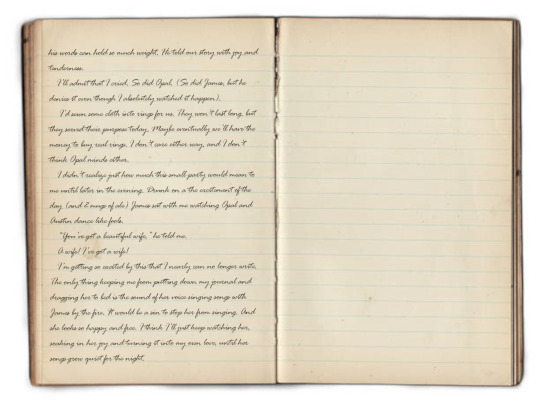
September 21st
I have had too much on my mind to write for the past few months. This journal has sat abandoned. Yet tonight, I find I must record the events that have occurred.
I have never had a better day than today. This morning as the world began to wake up, I had my breath stolen from me by Opal’s easy beauty. I couldn’t help but once again profess my love for her aloud. She giggled and kissed me sweetly, telling me how she felt the same about me.
I thought both men had been out in the yard working, but as we held each other close, James asked, “Would you be married?”
After we were startled for a moment, Opal said, “We can’t.”
The magic of the moment had left her quite quickly. Wanting to keep it alive a little longer, I said, “Yes, of course I would.”
Opal stared at me as if this surprised her, though I don’t understand why it should.
“Of course, I would marry you,” I repeated, taking her hands in my own.
“You’ve never said,” Opal told me.
“I thought you knew,” I told her. Besides, it’s not like we’d been able to be loud about how we felt before. Even now, to have spoken those words makes me nervous.
She kissed me, and I swear I melted into the floor. Her answer was as clear as day. She’d marry me too.
We didn’t stop until James coughed from where he stood and got our attention. I tried to pretend to be ashamed of it, but I wasn’t. I moved west, so I didn’t have to be ashamed.
Then James asked, “Wanna have a ceremony?”
It took Opal and me about 10 minutes of questioning to understand what he meant, given that there were only four of us and none of us was a pastor, but we did it today. We all put on our best clothes, and Austin married us.
It’s not official, but it was never going to be. Opal couldn’t stop crying the entire day. She kept looking at me, blushing, and looking away. At first, I was worried this wasn’t what she wanted, but just before we went outside to hold our “ceremony,” she kissed me and told me she’d been spending the whole day trying to figure out how lucky she was to love me and to be loved by me. It took a lot of restraint not to kiss her senseless right then.
We stood holding hands as Austin spoke of our love and what he’d seen in the time he’d known us. He journals like me, but I think his is more poetry than mine. When I’ve seen him get drunk, he often starts trying to speak in verse. It’s clear to me now that when sober, his words can hold so much weight. He told our story with joy and tenderness.
I’ll admit that I cried. So did Opal. (So did James, but he denies it even though I absolutely watched it happen).
I’d sewn some cloth into rings for us. They won’t last long, but they served their purpose today. Maybe eventually, we’ll have the money to buy real rings. I don’t care either way, and I don’t think Opal minds either.
I didn’t realize just how much this small party would mean to me until later in the evening. Drunk on the excitement of the day (and two mugs of ale), James sat with me, watching Opal and Austin dance like fools.
“You’ve got a beautiful wife,” he told me.
A wife! I’ve got a wife!
I’m getting so excited by this that I nearly can no longer write. The only thing keeping me from putting down my journal and dragging her to bed is the sound of her voice singing songs with James by the fire. It would be a sin to stop her from singing. And she looks so happy and free. I think I’ll just keep watching her, soaking in her joy and turning it into my own love, until her songs grow quiet for the night.
Outroduction
I hope you enjoyed reading this charming love story!
I didn’t have enough information to find the record of their official acquisition of the land, so unfortunately, we don’t know how the story ends for these couples.
We do know that for that moment in time, they were in love, and they were able to exist happily within that love.
I hope that moment lasted for a very long time.
Thanks for reading.
Links
First Nations Knowledge Center
This Land by Crooked Media
Native History Project from Grinnell University lesson on the Homestead Act
Crash Course US History on Westward Expansion
Link to Purchase An Indigenous People's history of the United States
#An Assumptive Anthology#queer triple a#fiction#lgbt#lgbtq#lgbtqia+#epistolary#historical fiction#journal#lesbian#sapphic#romance#gay#wlw#mlm#as in men loving men#not multi level marketing#homestead act#historical context
7 notes
·
View notes
Text
Being an American history junkie who is friends with other American history junkies should be great. Except when they have uhhhh different priorities re:American imperialism than you. “Except for vietnam he was a great president” mf that’s a pretty big except
#I love reading about Abe Lincoln but I would kill him again with my bare hands over the homestead act#< Lincoln thought is separate from the Vietnam thoight I just got mad about it in the car again#just txt
0 notes
Text
1862-Homestead Act
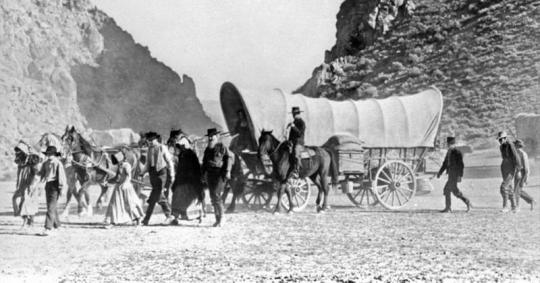
U.S. President Abraham Lincoln signs the Homestead Act into law, opening 84 million acres of public land to settlers
0 notes
Text
Book Review: Nuclear Nuevo Mexico: Colonialism and the Effects of the Nuclear Industrial Complex on Nuevomexicanos By Myrriah Gómez
Book Review: Nuclear Nuevo Mexico: Colonialism and the Effects of the Nuclear Industrial Complex on Nuevomexicanos By Myrriah Gómez
Reviewed By KAY MATTHEWS
Myrriah Gómez’s grandmother’s family was evicted from the Pajarito Plateau in the early 1940s when the US military and the atomic physicists arrived to build Los Alamos National Laboratory, the place that birthed the Nuclear Industrial Complex. She grew up in El Rancho, the community at the base of “The Hill” that supplied much of the work force, including her paternal…
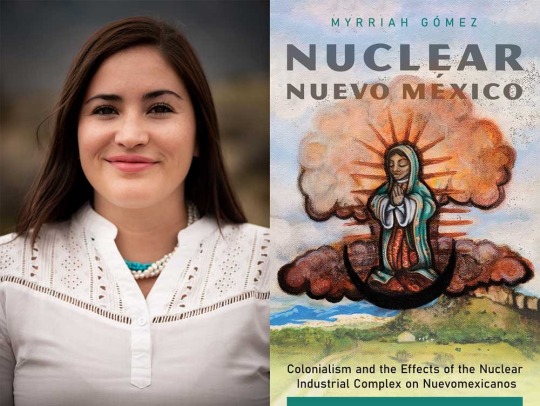
View On WordPress
#Alliance for Environmental Strategies#HOLTEC/NRC#Manhattan Project#Pajarito Plateau Homesteaders Association#Radiation Exposure Compensation Act#Tina Córdova#Tularosa Basin Downwinders Consortium
0 notes
Text
A Fascinating Book I'm Reading

One of the best non-fiction reads I've read in a while, it's not a military history book, but details specifically the Confederate government, culture, society, the legal system, and economy.
What I find most fascinating about the book was just how fucked up the Confederacy became even from the early outset. Especially in terms of law and order. Due to the incredible manpower demands most men of military age either enlisted or were later conscripted into the army. This resulted in severe manpower shortages at home. When this happened, the system of slavery the Confederates were fighting for became a grave liability as there was no one left to control the millions of slaves that populated the south. As a result, whole plantations of slaves would run away and form free communities in the wilderness, surviving by pillaging plantations and farms, or robbing travelers on highways. In Louisiana there was a slave town hidden deep in the swamps that housed 2,000 people! At the same time thousands of Confederate soldiers were deserting as the war started going bad. Many soldiers found that their homestead and family was falling apart in their absence, so they deserted. These deserters were declared outlaws, and as a result many banded together, formed groups, and made a living as bandits and marauders.
At the same time many officers in the Confederate army who were garrisoned in specific places became de facto military dictators and warlords over the territory they controlled. They often disobeyed the law and refused to carry out orders issued by the Confederate government, but due to manpower shortages and the disorganization of the government there was little that could be done to reign them in. Often, these warlord Confederates acted as bandits, pillaging the territory they controlled not just for food and necessary supplies but for valuables as well. In many cases, whole towns and even counties rebelled against Confederate military authorities as they were sick of being pillaged by warlord Confederates. A good example was Jones County, Mississippi which actually seceded from the Confederacy as a result. Often, these rebel towns and counties survived by banditry and became marauders themselves just to make a get by.
According to the author, by 1863 much of the rural south was in a state of lawlessness and anarchy with the countryside controlled by bandits, marauders, independent towns or counties, pro-Union enclaves, and military warlords. Like bruh, this would be a good setting for an open world RPG game, perhaps something set in the Red Dead Redemption Universe.
Anyway if you are a Civil War buff I highly recommend this book.
629 notes
·
View notes
Text
"I want to be a lesbian housewife" "I want to be a butch homemaker on our urban homestead..." Woman if you don't get a damn job and pay half this fucking rent. I don't have the straight man perversion where struggling under the weight of bills alone is rewarding if I have a sexy human pet at home to stroke my ego, and do mindless cleaning and cooking all day like a domestic Sisyphus. You are going to have to woman up, and unlearn this learnt female quality of wanting to be useless sexy baby or "my love language is acts of service" bangmaid for someone. Reframing it as a lesbian/"Queer" yearning doesn't make it less pathetic. I want to romance my equal. Not care for another child or be mothered. I cannot be alone in this.
845 notes
·
View notes
Text
#12Ancestors in 12 Months – (May) Social: The Black Homesteaders of Section 12 of Range 13E, Township 2S, Tallahassee Meridien, Live Oak, Suwannee County, Florida
Here's my new blogpost about Black Homesteaders and neighbors of my great grandfather, Randel Farnell, Ned Wilson and Shadrack Taylor, in Live Oak, Suwannee County, Florida.
In truth, I don’t know a lot about the men in my great grandfather’s (Randel Farnell) community who filed applications for land in the 1870s and ‘80s, under the Homestead Act of 1862. Until recently, I did not realize how many of his neighbors and potential friends had filed for claims under the Homestead Act. I especially did not realize how many Black neighbors had filed claims. Neither the…
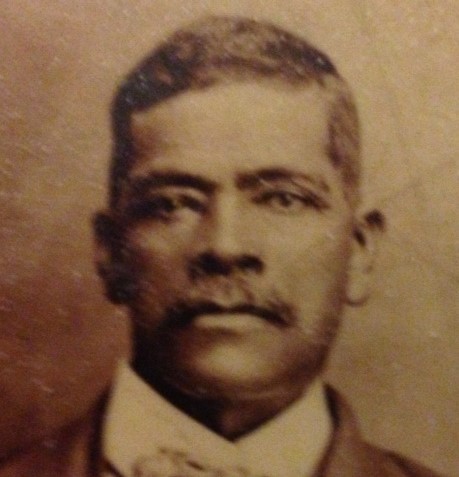
View On WordPress
#Adelice Goldwire#Bernice Alexander Bennett#Black Homesteaders of the South#Henry McGehee#Homestead Act of 1862#Live OAk Florida#Ned Wilson#Randel Farnell#Shadrack Taylor#William Forsyth Bynum Sr
0 notes
Text
this is so funny

like okay you have a wiki, some diy information. what are you going to do to actually change the infrastructure of society while defending against the attacks of the superstructure. do you actfually think that a "revolutionary social movement" can be built and effectively act with a wiki and a mastodon instance. is consumerism the actual problem to combat? or is it just a symptom? How is the IWW going to build a solarpunk world, what will you do with people who aren't in a workplace, or in other countries with already well established unions? how is food not bombs, a charity organization, going to build solarpunk?
So you have the details for a windmill but where will you build it? land is an expensive commodity almost everywhere in the world, and there is no land that isn't owned but accessible. How will you get the materials and workforce to build it? how will you get by while it's in construction? what infrastructure will you use to sustain a farm? or are you just rebranding colonial homesteading fantasies as environmental and punk?
Also a wiki and other online resources doesn't mean a concept such as cyberpunk, whose most popular depiction is an edited almond milk commercial, is happening. this is all unserious escapism. you're not doing anything that catholic charity is already doing. this is what happens when you reject every actually successful struggle against capitalism
496 notes
·
View notes
Text
Note: Reasons to Be Cheerful has had weirdly huge formatting issues for the past six or so months, so if that version is a mess, this link should work better.
"Florida Power & Light Company (FPL), the Sunshine State’s largest power utility, employs all the people you might expect: electricians, lineworkers, mechanical engineers — and a few you might not. For over 40 years, the company has kept a team of wildlife biologists on staff. Their task? Monitoring the giant carnivorous reptiles that reside in one of the state’s nuclear power plants.
Saving the American Crocodile
What sounds like a low-budget creature feature is actually a wildly successful conservation story. It goes like this: In 1975, the shy and reclusive American crocodile was facing extinction. Over-hunting and habitat decline caused by encroaching development had pushed its numbers to a record low. By 1975, when it was listed as endangered under the Endangered Species Act, there were only 200 to 300 left.
Three years later, in 1978, workers at the Turkey Point nuclear power plant in Homestead, Florida happened upon something that must have made them gasp: a crocodile nest along one of the plant’s 5,900-acre “cooling canals.” Rather than drive the crocs away — perhaps the easiest solution — FPL hired a team of biologists and implemented a Crocodile Management Plan. Its goal was unconventional: provide a suitable habitat for the crocs within the workings of the nuclear power plant, allowing both to coexist.
Over the course of the next 30 years, FPL’s wildlife biologists monitored nests, tagged hatchlings and generally created a hospitable environment for the reptiles. As it turned out, the plant’s cooling canals provided an ideal habitat: drained earth that never floods on which to lay eggs directly adjacent to water. Over the years, more and more crocs made the cooling canals home. By 1985, the nests at Turkey Point were responsible for 10 percent of American crocodile hatchlings in South Florida. In 2007, the U.S. Fish and Wildlife Service downgraded the American crocodile’s status from endangered to threatened, singling out FPL for its efforts.
The program continues to this day. To date, biologists have tagged some 7,000 babies born at the plant. In 2021, there were a record-setting 565 crocodile hatchlings at the Turkey Point facility.
"Reconciliation Ecology"
Turkey Point’s efforts are an example of what is known in the conservation world as “reconciliation ecology.” Rather than create separate areas where nature or animals can thrive in isolation from humans, reconciliation ecology suggests that we can blend the rich natural world with the world of human activity. Michael Rosenzweig, an emeritus professor of ecology and evolutionary biology at the University of Arizona, was a leading force in establishing this concept. The author of Win-Win Ecology: How the Earth’s Species can Survive in the Midst of Human Enterprise, Rosenzweig has pointed out that although human encroachment has typically been considered a threat to biodiversity, the notion that the world must be either “holy” or “profane,” ecologically speaking, is simply not true.
“In addition to its primary value as a conservation tool, reconciliation ecology offers a valuable social byproduct,” writes Rosenzweig in his first chapter. “It promises to reduce the endless bickering and legal wrangling that characterize environmental issues today.”
-via Reasons to Be Cheerful, May 5, 2022. Article continues below. All headings added by me for added readability.
Dr. Madhusudan Katti, an associate professor in the Department of Forestry and Environmental Resources at North Carolina State University, was inspired by Rosenzweig when he did his postdoc at Arizona State. Katti has now been in the field of reconciliation ecology for two decades and teaches classes on the subject. “To me it’s finding solutions to reconciling human development with biodiversity conservation,” Katti says.
This common ground between development and conservation can be consciously planned, like FPL managing a crocodile habitat at a nuclear power plant or the state-sponsored vertical gardens and commercial farms on high-rise buildings in Singapore. Other examples include the restoration of the coral reef around an undersea restaurant in Eilat, Israel, or recent legislation in New York City requiring patterned glass on high-rise buildings, making windows more visible to migratory birds. Other planned examples of reconciliation ecology can be more individually scaled: a rooftop garden in an urban setting, modifying your garden to earn a “backyard bird habitat” certification from the Audubon Society, or even just mowing your lawn less often...
Reconciliation Ecology: Nature's Already Doing It Without Us
But there are countless examples of “accidental” incidents of reconciliation ecology, as well. One of Katti’s favorites is the kit fox of California’s San Joaquin Valley. “The kit fox was one of the very first species listed on the Endangered Species Act,” Katti says. Its decline was caused by habitat loss through agricultural and industrial development, as well as the extermination of the gray wolf population, which led to an increase in coyotes. So kit foxes adapted and moved to new habitats. One of these was the city of Bakersfield, California.
“Bakersfield, surrounded by oil pumps, would be the last place you’d expect to find an endangered species,” Katti says. But researchers think kit foxes have migrated to Bakersfield because they actually have more protection there from predators like coyotes and bobcats. “The kit foxes have figured out that if they can tolerate the human disturbance and live with people, then they are safer from all these other predators,” he says.
Living in the city has led to some interesting behavioral changes. In the wild, for instance, a female kit fox gives birth to her young and raises them by herself in a den. But in the city, researchers have observed multiple females raising their litters together in the same den. “It’s like a form of cooperative breeding,” Katti says. “That wouldn’t happen in the wild.” ...
The Big Picture: How We Think about Conservation
Reconciliation Ecology isn’t just we humans welcoming animals like crocodiles and foxes into our environments, though. It’s also living with nature in a way that most Western societies haven’t done since the Enlightenment. “In recent years, there’s been a recognition that the ‘fortress conservation’ model — keeping nature separated from humans and not thinking of or valuing human-inhabited landscapes — those ideas are outdated,” says Katti.
In fact, in Katti’s classes on reconciliation ecology, he embraces the notion of reconnecting people with their land if they have been unjustly separated from it. “The term reconciliation also applies to all the colonial legacies where both nature and people have been harmed,” Katti says. “For Indigenous communities, the harm done to ecosystems, it’s happened together. So you can talk about addressing both. That’s where a lot of my thinking is at the moment.”
A hopeful version of this sort of reconciliation is happening in California where colleagues of Katti’s who are tribal members are re-introducing “tribal burns” in some areas. Controlled burns have been a part of many Indigenous cultures for millenia, both as a way to prevent devastating forest fires, but also to encourage the growth of certain plants like hazel that are used for basket-weaving and other crafts.
“The notion that people don’t belong there and ‘let nature take care of itself’ doesn’t really work,” Katti says. “That’s the legacy of Western European Enlightenment thinking — a divide between human and nature. That is a real faulty view of nature. People have been part of the ecosystem forever.”
-via Reasons to Be Cheerful, May 5, 2022
#a bit older but still ongoing/relevant and still very cool#florida#crocodile#reptile#ecology#environment#sustainability#endangered species#united states#california#kit fox#nuclear power plant#reconciliation#colonialism#the enlightenment#conservation#human beings#good news#hope#urban ecology
1K notes
·
View notes